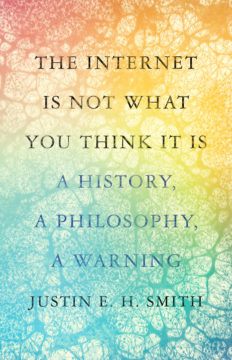Eric Banks in 4Columns:
 When did it become as hard to imagine what a good—or at least not as bad—internet might look like as to picture a world without the internet at all? Social-media mobs, conspiratorial thinking, deadly disinformation campaigns, gadget addiction, the funk of mass attention-deficit disorder: World-Wide-Web woes comprise a growth economy. The less acute but vague unease of our encounter with digital technology isn’t much alleviated by the possibility of imagining a truly off-the-grid alternative. (That a bit of shorthand like “off the grid” exists to describe a break from tech is as much a symptom of the problem as anything.) Perhaps to say that we feel backed into a corner by a claque of devices of our own making is not really to say much of anything at all.
When did it become as hard to imagine what a good—or at least not as bad—internet might look like as to picture a world without the internet at all? Social-media mobs, conspiratorial thinking, deadly disinformation campaigns, gadget addiction, the funk of mass attention-deficit disorder: World-Wide-Web woes comprise a growth economy. The less acute but vague unease of our encounter with digital technology isn’t much alleviated by the possibility of imagining a truly off-the-grid alternative. (That a bit of shorthand like “off the grid” exists to describe a break from tech is as much a symptom of the problem as anything.) Perhaps to say that we feel backed into a corner by a claque of devices of our own making is not really to say much of anything at all.
To a degree, the circularity of this empty prognosis is what Justin E. H. Smith signals at the tail end of the subtitle to his brisk exercise in media genealogy The Internet Is Not What You Think It Is: A Philosophy, a History, a Warning. Smith’s book was written in the midst of the COVID shutdown, that is, as the latest model (“hybrid”) of mediated identity (Zoom meets social isolation) was giving a sharp edge to our particular sense of being boxed in by the times.
More here.
